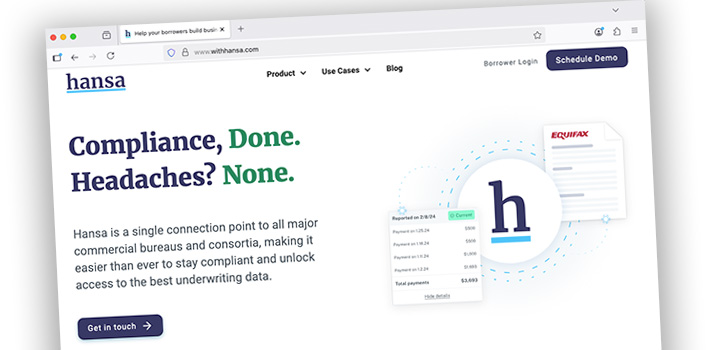Fintech
AdvanceIQ.ai Launches Risk & Portfolio Intelligence Platform for SMB Lending
February 5, 2026NEW YORK, Feb. 05, 2026 — AdvanceIQ.ai, a leading provider of risk and portfolio intelligence for the SMB lending and private credit market, today announced the launch of the AIQ Platform, a unified intelligence platform supporting SMB lenders and private credit investors—including merchant cash advance (MCA) and revenue-based finance (RBF) originators and investors.
Designed to support underwriting, portfolio management, and capital allocation, the AIQ Platform replaces fragmented tools, spreadsheets, and static reports with a cohesive analytics and intelligence system purpose-built for SMB alternative lending originators and investors. As SMB AltLending increasingly intersects with private credit and institutional capital, the AIQ Platform provides a shared, consistent view of risk, performance, and portfolio dynamics.
The AIQ Platform consists of three integrated components:
- PortIQ — portfolio intelligence delivering performance analysis, attribution, benchmarking, forecasting, and operational insights
- SMB RiskIQ (SRI) — AdvanceIQ.ai’s proprietary risk scoring and segmentation model, trained on SMB credit performance outcomes, with deep coverage of MCA and RBF portfolios
- ARIA — an AI-driven intelligence layer that interprets portfolio analytics, risk signals, and portfolio-relevant news to provide natural-language insights and decision support
Together, these components operate as a unified intelligence system and are designed to integrate directly into existing CRMs, origination and servicing systems, marketplace platforms, and internal data environments.
“The combination of PortIQ and SMB RiskIQ has given our team a much clearer view into portfolio performance and deal quality,” said Daniel DeMeo, CEO of Lendr. “We’re able to surface risk signals earlier and move faster on underwriting and portfolio decisions. ARIA adds another layer by helping summarize those signals into clear takeaways our team can review and act on.”
“As SMB lending businesses scale, managing risk and performance across the portfolio becomes significantly more complex,” said Tomo Matsuo, Founder & CEO of AdvanceIQ.ai. “The AIQ Platform gives originators and investors a clear, consistent intelligence layer to understand what’s working, where risk is emerging, and how to make better decisions to improve portfolio performance and profitability.”
The AIQ Platform is already in use by leading SMB lenders and private credit participants and is helping move the market toward more systematic, data-driven approaches to portfolio management and risk assessment.
To schedule a demo or request trial access, visit www.advanceiq.ai.
About AdvanceIQ.ai
AdvanceIQ.ai is an AI-powered risk and portfolio intelligence platform built for SMB lending and private credit, with deep coverage of merchant cash advance (MCA) and revenue-based finance (RBF). Grounded in deep industry expertise, its product suite—PortIQ, SMB RiskIQ (SRI), and ARIA (AdvanceIQ.ai Risk Intelligence Agent)—combines domain knowledge with advanced analytics to deliver portfolio intelligence, risk scoring, and AI-driven insights that help originators and investors make faster, smarter, and more profitable decisions.
AdvanceIQ.ai also empowers platform and technology partners by embedding these capabilities directly into third-party systems, enabling partners to enhance workflows, expand insights for their users, and deliver differentiated value through seamless integration of PortIQ, SRI, and ARIA.
Press Contact
AdvanceIQ.ai Media Relations
Email: info@advanceiq.ai
PayPal: Business Loan and Working Capital Originations of $600M in Q3
November 3, 2025PayPal originated approximately $600M in business loans and working capital loans in the third quarter. A financial institution makes the loans to their clients and PayPal purchases the receivables and services the portfolio. Under this basis the company has purchased $1.6B worth of receivables for the first nine months of 2025.
“The allowance for credit losses at September 30, 2025 for our merchant receivable portfolio was $163 million, an increase from $113 million at December 31, 2024,” PayPal stated in its earnings report. “The increase in allowance for credit losses was related to a decline in credit quality of merchant loans outstanding primarily from modifications in acceptable risk parameters in 2024, which included broadened eligibility. In the second quarter of 2025, we updated our expected credit loss model for all portfolios to utilize multiple economic scenarios rather than the single scenario previously utilized. These changes did not have a material impact on our allowance for credit losses in the period.”
That Fintech Business Loan Performance Should Help You: How Hansa is Giving Both Borrowers and Lenders a Powerful Tool
October 15, 2025“Business owners want to be reported on,” said Henry Magun, founder and CEO of Hansa. “When we do a lot of surveys around this and when we survey small business owners en masse, would they rather borrow from a provider that does report to the business credit bureaus or does not, 85% of business owners say that they would rather borrow from a provider that does report to the business credit bureaus.”
It’s a familiar story: small business borrows from a fintech lender, repays it perfectly, and later on down the road applies for financing elsewhere believing that their previous payment history will support an approval or more favorable terms, only to find out there’s no public record of it at all.

“We hear that all too often,” said Magun. “It’s a very common experience, and that is one of the reasons why we are extremely focused on not only building the back-end pipes to do the furnishment to the bureaus for the lenders and make that process effortless, but also creating a front-end product that makes it a transparent process for the SMBs.”
Hansa, headquartered in New York City, enables lenders to report payment history to the credit bureaus and access existing reports on their customers. The key here is that it’s business credit reporting, not personal. Although most people are familiar with Dun & Bradstreet, Experian and Equifax also have business bureaus specifically for business credit. There’s also consortium-based organizations such as the Small Business Finance Exchange, for example, that take in commercial credit data.
While term loans and cards for SMBs, two rapidly growing products in the fintech space, are their main focus, the Hansa platform can make reporting possible for just about anything.
“We realize that there is such a diversity of product-type in the SMB financing space,” Magun said. “Is it a term loan? Is it a card? Is it an MCA product? You know, are there daily payments, weekly payments, monthly payments? All across the board, we do it all.”
The benefits of reporting business credit are obvious. Lenders can claim that good performance will legitimately build business credit, borrowers benefit from actually building business credit, and lenders can rely on this highly relevant data to drive more informed decisions.
“It’s really about getting the fintech ecosystem towards the future in which companies are focused on supporting financial wellness, and we really view credit furnishment in the SMB space as core to that, ultimately being able to reliably build credit is extremely important for financial mobility, economic mobility because it enables people to [graduate] to bank products and things like that, and being able to take your history with you in order to progress. That’s really important for economic mobility.”
 On the flipside, for lenders that have spent years fine-tuning algorithms to predict payment performance outside of traditional credit reports, one area that continues to remain cloaked in obscurity is payment performance with other fintech lenders. Alternative methods, at least within the fintech community, are commonly used to make a best-guess effort, such as employing automated tools to scan an applicant’s bank account deposits with a known list of lender names and then matching them to corresponding bank debits to predict the performance and status of those accounts. But even if one can assess with a high degree of confidence about how those credit lines are performing, it’s not exactly an official affirmation from the lender, and the transaction history might not go far back enough. Besides, these risk assessment methods are entirely personalized to the lender, and don’t necessarily give the business an asset (a universally recognized credit report), that it can furnish elsewhere and benefit from. A business could use a credit report for a trade line or a bank loan or in some other transaction where it could hold weight for them, for example.
On the flipside, for lenders that have spent years fine-tuning algorithms to predict payment performance outside of traditional credit reports, one area that continues to remain cloaked in obscurity is payment performance with other fintech lenders. Alternative methods, at least within the fintech community, are commonly used to make a best-guess effort, such as employing automated tools to scan an applicant’s bank account deposits with a known list of lender names and then matching them to corresponding bank debits to predict the performance and status of those accounts. But even if one can assess with a high degree of confidence about how those credit lines are performing, it’s not exactly an official affirmation from the lender, and the transaction history might not go far back enough. Besides, these risk assessment methods are entirely personalized to the lender, and don’t necessarily give the business an asset (a universally recognized credit report), that it can furnish elsewhere and benefit from. A business could use a credit report for a trade line or a bank loan or in some other transaction where it could hold weight for them, for example.
“It really is a ‘rising tide raises all ships’ scenario in the sense that in a more mature ecosystem where there’s higher ubiquity of reporting, everyone benefits,” Magun said. “It helps all the funders and creditors on their underwriting processes, and it helps the business owners, the applicants, because it increases the portability of your credit history.”
The usefulness speaks for itself. Hansa, for example, has increased the number of reports that they’re furnishing data on by more than 400x since the beginning of this year. And the lenders can show off to their borrowers what they’re reporting and where it’s being reported to in any manner they wish.
“We’ve started to see really great traction amongst these various players, and we’re really excited to be working with them and it works,” said Magun.
Already they are seeing improved payment rates and increased engagement rates between the borrowers and lenders.
“It’s really powerful,” Magun said, “and SMBs really do care about being able to build their credit.”
Catching Up With Kalamata
September 18, 2025 Kalamata Capital Group is continuing to fund in Texas through one of its affiliated entities, the company confirms. Kalamata, which recently upsized its 2024 securitization by 25% with notes expandable up to $500 million, offers a variety of funding products to small businesses around the United States. A new law that recently went into effect in Texas has prompted Kalamata and companies like theirs to get the word out to their partners about any applicable adjustments.
Kalamata Capital Group is continuing to fund in Texas through one of its affiliated entities, the company confirms. Kalamata, which recently upsized its 2024 securitization by 25% with notes expandable up to $500 million, offers a variety of funding products to small businesses around the United States. A new law that recently went into effect in Texas has prompted Kalamata and companies like theirs to get the word out to their partners about any applicable adjustments.
More front and center for the company, however, is the introduction and evolution of Kalamata Cash, its in-house proprietary software.
“We went live with everything, including our syndicator profiles and access to the outside world as well, and that’s been a really exciting development for the company,” said Brandon Laks, co-president at Kalamata, “because instead of licensing software, which the software we were on was great before, it gives us the ability to roadmap exactly what we want to do.”
Kalamata, for example, is 100% broker-driven, and they can custom-tailor the process to best suit their relationships.
“Our brokers can come in and see live calculators,” Laks said, “so when they submit a deal and we send an offer, they can get a live view of what steps are outstanding, they can play around with the sliders and choose their offers.”
And there’s a lot more on the horizon that they’re integrating with and adding on.
Guggenheim Securities served as sole structuring advisor and the sole initial purchaser of the notes in the Kalamata securitization deal. At the time of the announcement, Laks said, “The access to additional capital will allow Kalamata to continue supporting Small Businesses and invest more capital in proprietary technology to stay at the forefront of the small business financing industry.”
Dragin Technologies Unveils the Industry’s First AI Merchant Integrity Dashboard, Setting a New Standard for Underwriting Accountability
September 17, 2025New York, NY — September 17 2025 — Dragin Technologies, the automation engine powering some of the fastest-growing revenue-based financing companies, today announced the launch of its groundbreaking AI Merchant Integrity Dashboard, the first tool of its kind designed to ensure clean, accurate, and trustworthy underwriting decisions.
This new AI-powered feature combines every critical data source in the underwriting process — application forms, bank statements, credit reports, background checks, Dragin’s proprietary AI Web Report, and even the merchant’s interview — into a single, intelligent report. It then cross-references every data point to uncover discrepancies, validate claims, and flag potential risks before an offer is made.
How It Works
The AI Merchant Integrity Dashboard automatically reviews and cross-verifies all data points across multiple documents. It checks everything from business addresses to revenue patterns, ensuring consistency and truthfulness at every step.
For example:
- If a merchant claims their revenues are steadily increasing, the AI will verify this against actual bank statement data.
- If the merchant says they have “great credit,” Dragin will confirm that claim and flag missed payments or delinquencies.
- Business addresses are cross-checked between the application, background checks, and banking data to catch mismatches or fraudulent entries.
Every red flag identified by the AI must be manually reviewed and approved by an underwriter before a deal can move forward, creating a new layer of accountability and transparency in the underwriting process.
Why This Matters
For revenue-based financing companies, speed and accuracy are essential — but so is trust.
With the AI Merchant Integrity Dashboard, underwriters can no longer miss critical details or claim ignorance after a deal closes.
Key benefits include:
- Early fraud detection through cross-document analysis
- Cleaner, fully reconciled deal data for every file
- Reduced merchant default rates by catching inconsistencies up front
- Stronger underwriting accountability, protecting funders from costly mistakes
“This changes everything,” said Mark Ross, CEO of Dragin Technologies.
“For the first time, funders can hold their teams accountable for every detail in a deal. Our AI does the heavy lifting, surfacing risks that used to take hours — or never got caught at all. No more guessing. No more missed red flags.”
Part of Dragin’s Full Automation Suite
The AI Merchant Integrity Report is the latest innovation in Dragin’s end-to-end deal automation platform, which includes:
- Automated email parsing and document classification
- AI-powered application and bank statement reader
- Pre-qualification and pre-decline logic
- DraginForce CRM with built-in automation suite
- Real-time ISO portal for faster deal negotiations
- End-to-end deal tracking and syndication portal
About Dragin Technologies
Dragin Technologies builds the tools that power the future of revenue-based financing. With advanced AI, machine learning, and automation technology, Dragin enables funders to scale faster, reduce risk, and make smarter decisions. Its flagship CRM, DraginForce, and cutting-edge automation modules are trusted by some of the largest and fastest-growing funders in the industry.
Learn more at www.dragin.io
The Merchant’s Paying, The Bank Statements Were Fraudulent: Talking With MoneyThumb
September 16, 2025Small funders trying to tackle fraudulent submissions with no tools stand almost no chance in today’s environment. A recent survey conducted by both MoneyThumb and deBanked, for example, found that small funders experience fraud in 11.8% of applications on average, more than double the rate of larger funders. In the past, detecting altered documents such as bank statements, was best managed by experienced underwriters, but now with technology and AI in the palm of everyone’s hands, today’s fraud is often imperceptible to the naked eye.
“If you go back to 2020 when we created this [Thumbprint technology], I would say about 80 to 85% of bank statements that were fraudulent we would look at and say, ‘there’s the fraud,'” said Ryan Campbell, CEO of MoneyThumb. “Now it’s sub-5% that I can identify just with the human eye, and so technology has just absolutely created an environment where people can create fraud in a way that they never could.”
Thumbprint is MoneyThumb’s patented fraud detection tool. It can bolt into any industry CRM. Historically, an immediate default was the first clue that a fraudulent app had slipped through the cracks, but even accounts in good standing may not be what they seem.
“[What] we’ve seen is people take a smaller loan, then a slightly larger loan, and then the big one, the third loan—default,” said Campbell.
 Bank statements that are otherwise in perfect order may have had their transaction descriptions edited so that loan deposits from third parties look like revenue or round-trip payments with the owner’s personal account are reclassified to look like daily sales. For fraud like this, the numbers are real, the statements are real, but what’s revenue and not revenue is obfuscated. And when the deal is approved based on the misleading metrics the scammers can actually stick around to pay for a while to convince the underwriters that they’re worthy of more.
Bank statements that are otherwise in perfect order may have had their transaction descriptions edited so that loan deposits from third parties look like revenue or round-trip payments with the owner’s personal account are reclassified to look like daily sales. For fraud like this, the numbers are real, the statements are real, but what’s revenue and not revenue is obfuscated. And when the deal is approved based on the misleading metrics the scammers can actually stick around to pay for a while to convince the underwriters that they’re worthy of more.
“We’ve run quite a few portfolio analyses for our funders, and so we’ll review all of the statements that they have, all of the funded deals that they’ve done, and many are surprised to find out that they actually have fraudulent paying accounts on their books,” Campbell said.
Since the rate of fraudulent applications is so material, catching the fraud as early as possible is paramount. This saves cost on underwriting, reduces time spent on deals that won’t move forward, and spares referral partners the pain of a deal getting killed at the finish line for an uncurable problem.
“As soon as it comes in, rather than wasting time on ‘are we collecting this? Are we extending offers?’ because think, it’s not just the fraud,” said Campbell. “Even if you can catch the fraud at the very end, somehow it’s not the catching part, it’s the fact that your staff is working a fraudulent deal for some matter of days. And Thumbprint just says, ‘get it out. It’s gone, done,’ and right at the beginning of the process.”
From the CERN Large Hadron Collider to Funding Working Capital Loans to SMBs
August 20, 2025When deBanked stumbled upon a scoop that DoorDash had begun offering merchant cash advances in late 2021, the tech and financing team behind it had not been on anyone’s radar. That company was Parafin which at the time appeared to be a startup comprised of former Robinhood engineers. But the backstory is a bit more wild because its CEO and Co-founder Sahill Poddar previously worked on getting his PhD by discovering the Higgs boson particle at CERN’s Large Hadron Collider. His credentials include a Doctorate (summa cum laude) in Particle Physics at European Council for Nuclear Research (CERN), Geneva, Switzerland and before that he was a Visiting Researcher for the Max-Planck Institute for Nuclear Physics in Germany. But today, at Parafin, his company makes $10 billion in funding offers to small businesses EACH DAY. The company has now funded more than 30,000 businesses since inception.
Turner Novak at The Peel secured Poddar as a guest on how Parafin came to be and it’s a must watch.
Adding Event Connections to DailyFunder
August 12, 2025MY BIG PET PEEVES WITH “EVENT APPS” ARE:
1. 95% of users stop using them after the event is over.
2. Most are white labeled from a third party with no customizable solutions.
3. They are generally zero-sum in that everyone can see you’re going or no one can. People want to choose their own visibility.
4. If a boss buys 10 tickets under their name for their team, it makes it hard for the individual team members to be able to access the app because their info isn’t in the system.
5. There are generally no moderation capabilities to limit or stop abuse.
6. Redundancy.
We had a deBanked Events App (2018 – 2023 white labeled), a deBanked App (2015 – 2017 white labeled), and a DailyFunder App (2013 – 2017 white labeled), but we recently rebooted a DailyFunder App only.
Why DailyFunder? With 17,000+ members, 3 million+ annual page views, and an average session > 10 minutes, it seems the most logical starting point to tackle point 1 above, which is keeping a party going 24/7 instead of just a few days before an event and never again right after. We’ve moved development in-house, no more white labels. We can put events in there whether they’re affiliated with us or not. You can let people know if you’re going or not. You can dm other people that plan to go. You can follow up with them afterwards. You can see the sponsors. We can put video content in there like tech companies that demoed or the interviews on the red carpets. No, you won’t see the whole attendee list, but you’ll be able to see those that want other people to connect with them at each one. You can use your real name or be pseudonymous. We can remove fakers. You can post on the forum. You can see what people are saying. It doesn’t all end when the event ends. You can see news headlines from deBanked and other video content we choose to put on there.
This is a work-in-progress but currently live in the Apple App Store and Google Play Store. If you have ideas or suggestions, email them to webmaster@dailyfunder.com. There’s some bugs we’re aware of. You must have a DailyFunder account already to log in. The registration process is still only on the website but we’ll change that.
Some thoughts are being able to add events like a Title sponsor’s cocktail party, a related golf-outing, etc. People are always asking which company is having a party after an event or before.
So instead of having to go on the forum, facebook groups, linkedin, or the whatsapp chats to be like “yo, xyz is happening.” or “who’s going?” we can just add it in here and then everyone can see them in one place to communicate with each other about them if they want to.
Open to suggestions.





























